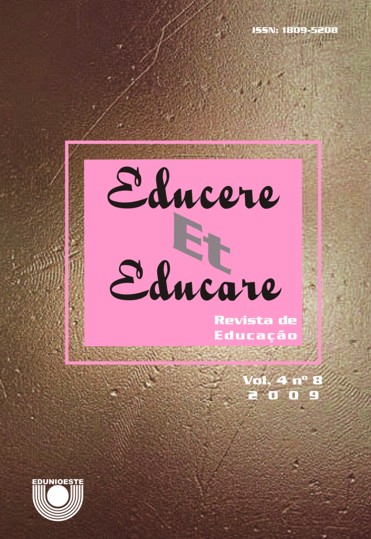OPTIMIZATION OF PORTUGUESE CHILDREN’ FREE TIME IN NEW XXI’ CENTURY FAMILIES
DOI:
https://doi.org/10.17648/educare.v4i8.2555Keywords:
escola a tempo inteiro (ETI), ocupação de tempos livres, actividade de enriquecimento do currículo, ensino fundamentalAbstract
This study describes and interprets the historical process of creation and implementation of the school operating on a full time basis, in children’s free time management in the basic education in Portugal. A qualitative approach has been adopted to collected data through interviews with the Regional Secretary of Education, the Regional Director of Education, the president of the Town Council of S. Vicente, the Directors and the thirty questionnaires responded by the teaching staff in the two schools operating on a full time basis. The project undertaken reveals that the school operating on a full time basis was instituted by the Portuguese Government Autonomous Region (Ilha da Madeira), with teacher participation and involvement, after careful consideration of multiple factors that affected student learning. The measure implemented produced changes at the school level, among the children, families, teachers and the educational community. Teachers were also faced with playing new roles. We conclude the existence of implications to the teachers at employment, collaboration and live together levels.Downloads
Published
18-03-2010
How to Cite
POCINHO, M. D.; CAPELO, R. OPTIMIZATION OF PORTUGUESE CHILDREN’ FREE TIME IN NEW XXI’ CENTURY FAMILIES. Educere et Educare, [S. l.], v. 4, n. 8, p. p. 19–35, 2010. DOI: 10.17648/educare.v4i8.2555. Disponível em: https://e-revista.unioeste.br/index.php/educereeteducare/article/view/2555. Acesso em: 16 dec. 2025.
Issue
Section
Núcleo Temático: Trabalho e Educação Profissional
License
Aviso de Direito Autoral Creative Commons
Política para Periódicos de Acesso Livre
Autores que publicam nesta revista concordam com os seguintes termos:
1. Autores mantém os direitos autorais e concedem à revista o direito de primeira publicação, com o trabalho simultaneamente licenciado sob a Licença Creative Commons Attribution que permite o compartilhamento do trabalho com reconhecimento da autoria e publicação inicial nesta revista.2. Autores têm autorização para assumir contratos adicionais separadamente, para distribuição não-exclusiva da versão do trabalho publicada nesta revista (ex.: publicar em repositório institucional ou como capítulo de livro), com reconhecimento de autoria e publicação inicial nesta revista.
3. Autores têm permissão e são estimulados a publicar e distribuir seu trabalho online (ex.: em repositórios institucionais ou na sua página pessoal) a qualquer ponto antes ou durante o processo editorial, já que isso pode gerar alterações produtivas, bem como aumentar o impacto e a citação do trabalho publicado (Veja O Efeito do Acesso Livre).
Licença Creative Commons
Esta obra está licenciada com uma Licença Creative Commons Atribuição-NãoComercial-CompartilhaIgual 4.0 Internacional, o que permite compartilhar, copiar, distribuir, exibir, reproduzir, a totalidade ou partes desde que não tenha objetivo comercial e sejam citados os autores e a fonte.


